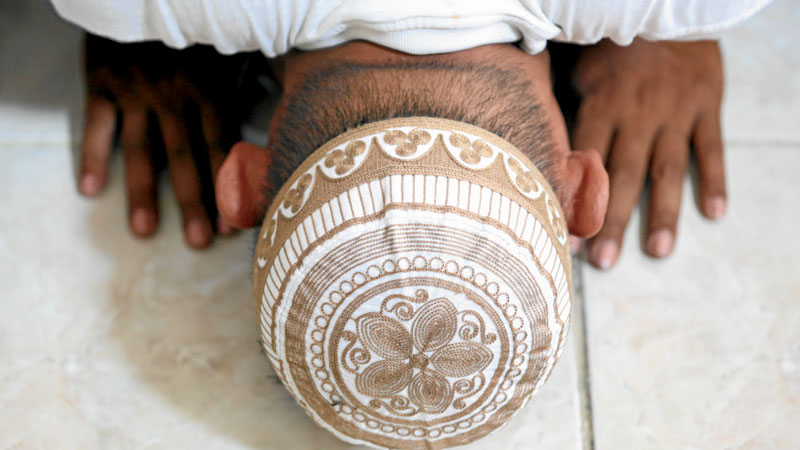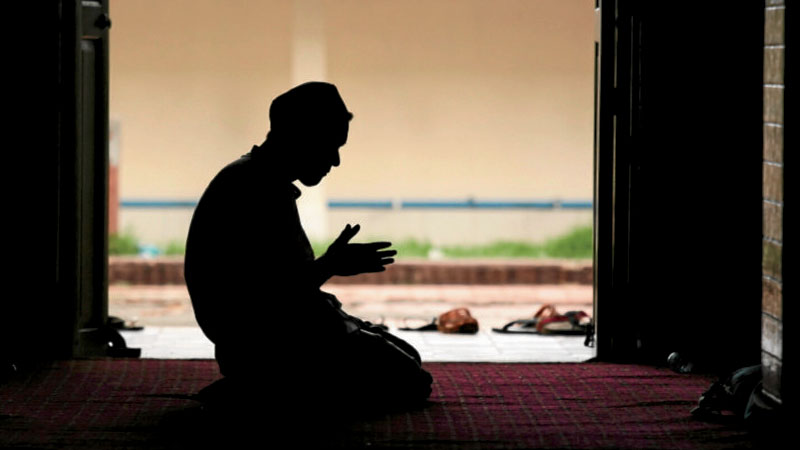Muslims start dawn-to-dusk fast today

RAMADAN A Muslim man bows in prayer at Salam Mosque on Tandang Sora Avenue in Quezon City’s Barangay Culiat before the start of the Islamic fasting month of Ramadan. NIÑO JESUS ORBETA
COTABATO CITY—Following the sighting of the crescent moon last night, Ramadan has started for followers of Islam, who will start fasting today (Monday) from dawn to dusk for a month.
They will also fully abstain from drinking and marital sex.
Mufti Abu Huraira Udasan of Darul Ifta (House of Opinion) for Maguindanao and Cotabato said the crescent moon was sighted in the neighboring country of Malaysia but not in the Philippines.
Ramadan is the ninth of the 12-month Hijri lunar calendar, and is considered the holiest month in Islam. It was during this month that God’s revelations in the Koran were completed, according to the history of Islam.
Maguindanao and Cotabato Grand Mufti Abu Huraira Udasan earlier said the start of Ramadan fasting would either be Monday or Tuesday, depending on the reports of moon sighting missions dispatched yesterday to different strategic areas in Mindanao.
Article continues after this advertisementThe Regional Darul Ifta in the Autonomous Region in Muslim Mindanao (RDI-ARMM) joined for the first time the Muslim world’s annual lunar observation to determine the first day of fasting.
Article continues after this advertisementThe group, organized by ARMM Gov. Mujiv Hataman, convened on May 24 the country’s Muslim scholars, legal experts and representatives of Muslim organizations in Zamboanga City, according to an ARMM press statement yesterday.
Fasting was practiced by biblical prophets and followers of early Abrahamic religions, including Christianity (Acts 13:2; 14:23; I Corinthians 7:1-5; Matthew 6:16-18; Daniel 1:8-14; II Kings 24:13-14).
In the Koran, the Muslims are taught: “Fasting is prescribed unto you, as it was prescribed unto those before you, that ye may learn self-restraint in piety” (2:128).
Alim Abdulmuhmin Mujahid, executive director of the RDI-ARMM, said a set of Newtonian reflector telescope was provided to each of its five provincial offices in the region, as well as to the Darul Ifta of ulama (scholars) on the Zamboanga Peninsula for the visual sighting of the crescent moon.
With the precision of modern astronomical instruments, Mujahid said the RDI-ARMM hoped to address conflicting views that Filipino Muslims held in lunar reckoning every time Ramadan was about to start or end.
For centuries, Muslim scholars have hardly resolved whether the sighting of the crescent moon should be by the naked eye or by using modern scientific instruments.

MOSQUE SCENE A Muslim devotee prays at Blue Mosque in Taguig City in Metro Manila before the official start of the holy fasting month of Ramadan. JILSON SECKLER TIU
All four Sunni Muslim schools of law are for “eyewitness evidence (of moon sighting), provided by sources with established credibility.”
Authorities said this was established by Sunni imams prior to the invention of the space observatory telescope, and based on Prophet Muhammad’s teaching: “Fast when the moon is sighted at the end of Sa’ban (the eighth Hijri month), and end fasting as the moon rises in Sawwal (the tenth month).”
But muftis said even the old Sunni Muslim schools were open to continuing the learning process through consultation and other means, resulting in modern-day “ijma” (consensus).